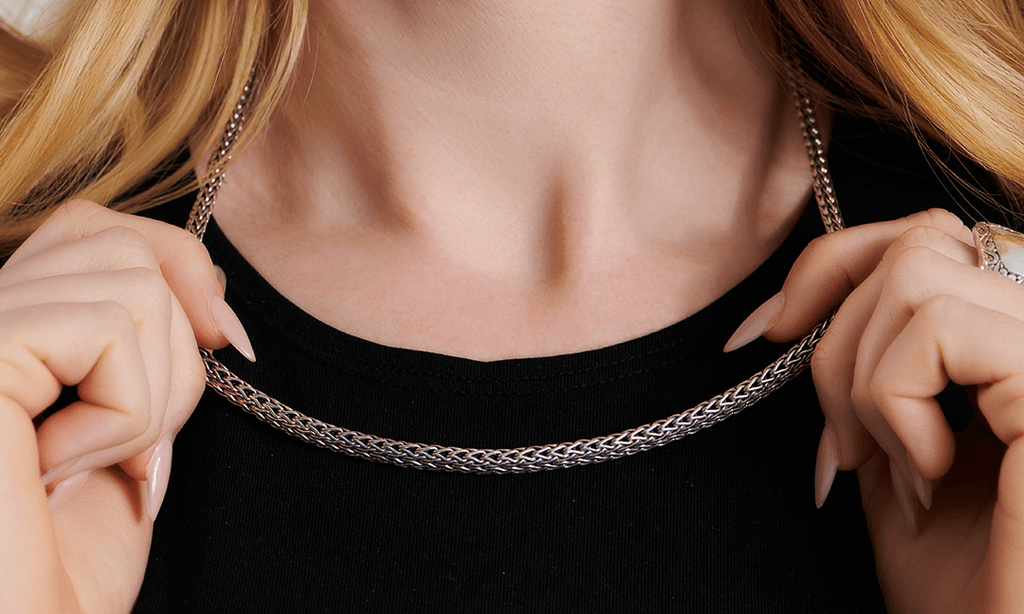No Products in the Cart

Yes, sterling silver will naturally be tarnish over time due to its composition of 7.5% other alloys.
Sterling silver is also known as Silver 925. The number of 925 refers to the composition of jewelry material which contains 92.5% silver and 7.5% other alloys such as copper. This composition has become the international standard that regulated by FTC (Federal Trade Commission) in the United States.
While 99.9% pure silver is more tarnish-resistant than 92.5% silver or sterling silver, so why do you not use 99.9% pure silver instead of 92.5% silver?
The definition of pure silver is for jewelry piece that contains 100% silver or at least 99.9% with maximum 0.1% only trace amounts of additional metals.
Pure silver is rarely found in the jewelry products because it is too soft for a Silversmith to craft a creative jewelry design. High purity makes it relatively weak and soft, that makes pure silver jewelry be easily dented from the slightest contact with hard surfaces throughout daily routines.
Pure silver appears more valuable than sterling silver, however, its softness renders it unsuitable for crafting quality jewelry piece in a creative design.
The solution is to mix silver with other alloys to create a harder metal that can easily be crafted by the Silversmiths in a creative design, with composition of 92.5% silver and 7.5% other alloys which has become the international standard. That makes sterling silver jewelry a highly durable material ideal for everyday wear.
Does sterling silver tarnish?
Sterling silver jewelry will naturally be tarnish over time with just constant exposure to open air in long period of time, it can get darker, dull and lose its shine, however, light tarnish can be restored easily by wiping using a polishing cloth. Professional jewelry cleaner is recommended for heavily tarnished sterling silver jewelry.
How to care sterling silver jewelry?
When you are not wearing your jewelry, please store it inside a specialized jewelry storage box or jewelry pouch to help minimize tarnishing and less exposure to open air.
Always put on your sterling silver jewelry last to avoid contact with hair products, perfumes, cosmetics or lotions. Over time, these products will build residue on your jewelry.
Do not wear sterling silver jewelry in the ocean, hot tub, pool, bath or shower as saltwater, heat or chlorine will damage your piece. While it may not instantly damage your jewelry piece, always keep your jewelry dry to maintain longer lifetime. You may wear your sterling silver jewelry during workout and get it wet, but it’s recommended to dry it with cloth towel as soon as possible.
POLISHING CLOTH
Polishing cloth is a specialized silver polishing cloth that contains cleaning agent to remove tarnish on silver jewelry, it is not just a regular household cleaning cloth, not an eyeglasses cleaning cloth, not a microfiber cloth, not a smartphone screen cleaning cloth. Polishing cloth must not be washed as it will lose its effectiveness because of losing the cleaning agent.
Gently rub the jewelry surface with polishing cloth to loosen tarnish. It is normal to see dark residue on the cloth and become blackened eventually, it is a sign that the cloth is working effectively! Do not use silver polishing cloth to wipe diamond, gemstones, pearl. Keep out of reach of children. Always wash your hands after use.
What’s included in DEVATA packaging?
Every purchase of DEVATA jewelry includes a luxury leather pouch and a polishing cloth as part of the accessories inside the packaging. When you are not wearing your DEVATA jewelry, please store it inside DEVATA pouch to help minimize tarnishing and less exposure to open air. Wipe your sterling silver jewelry using DEVATA polishing cloth to loosen tarnish.